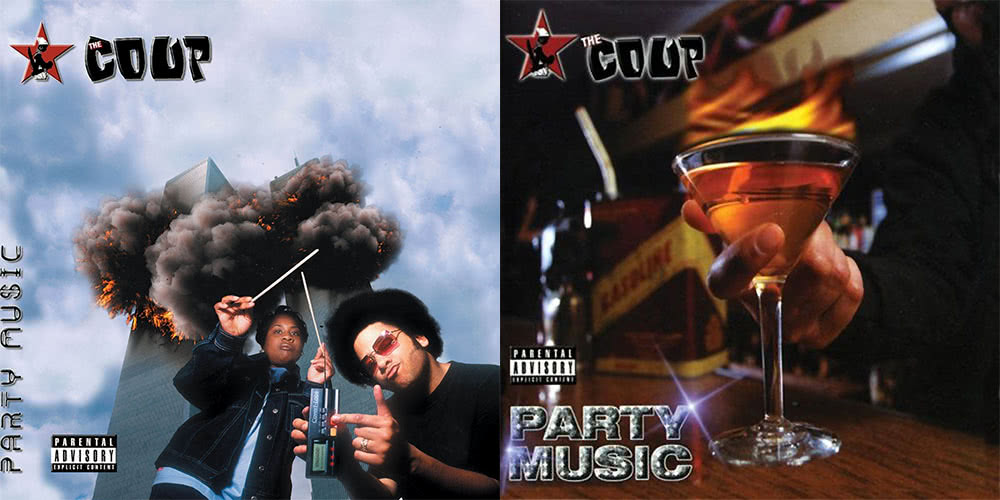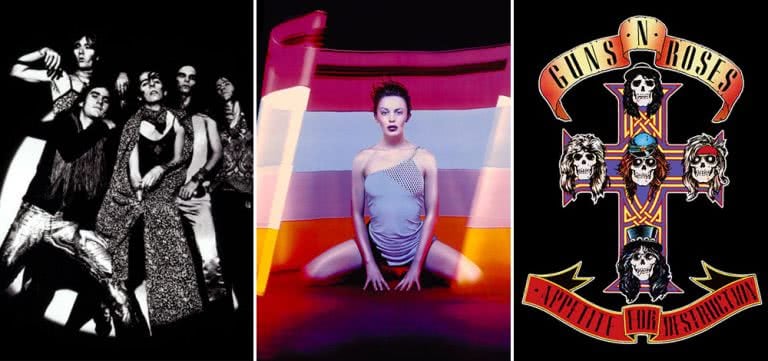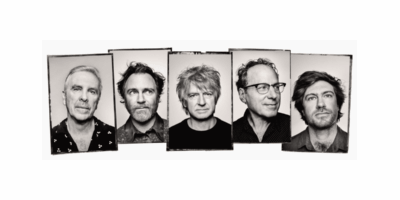Picking a good album cover can be a pretty hard job. Between attempting to use something that is eye-catching and representative of your image, it has to also pass by the censors if you want it to be seen by as many people as possible, making some albums controversial.
While some bands like to make a point of being controversial and enjoy making their album covers as shocking as possible, plenty of other acts have released seemingly-innocent album covers that have become infamous for some rather ridiculous reason.
With that in mind, we’ve decided to take a look back through our eclectic record collections and dust off some of the records whose covers have alternative versions thanks to the powers that be deeming the original covers controversial. They might be offensive, or they might be in poor taste, but above all, they certainly displeased someone with a bit of power.
If you don’t see your favourite controversial cover here, don’t worry. We’ve covered this topic before, and this certainly won’t be the last time we take a look back at some of these infamous record sleeves of controversial covers.
Guns N’ Roses ‘Appetite For Destruction’ (1987)
This one is well-known to record collectors out there, but many casual fans are unaware that Guns N’ Roses’ 1987 debut originally featured a far different cover when it was first released.
While its iconic ‘cross and skulls’ has now become synonymous with the band’s image, the original album cover included a painting by artist Robert Williams. Rather understandably, retailers weren’t too keen on stocking an album that featured a robotic rapist receiving its comeuppance, so the record was pulled.
As a compromise, the offending artwork was moved to the inside sleeve, and a new cover image – which was originally a tattoo design – was slapped on future editions of the record.
Love Music?
Get your daily dose of metal, rock, indie, pop, and everything else in between.
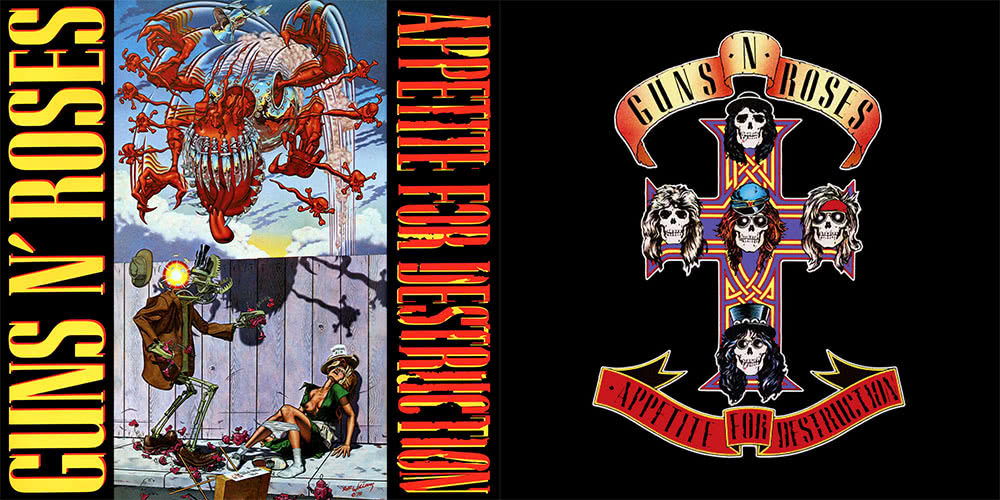
Alice Cooper ‘Love It To Death’ (1971)
While Alice Cooper’s 1971 album Love It To Death might have been their first big commercial hit, it also stirred a bit of controversy thanks to its album cover, which featured the group’s eponymous frontman pulling a bit of a prank.
During the photo shoot for the record, Alice Cooper covered himself in a cape, which he then used to his advantage. Wanting to have a bit of fun, he positioned the cape in such a way that it would show his thumb, positioning it in front of him so as to make it look like his penis was exposed.
While we’re sure a few chuckles were shared between band members, the folks at Warner Bros. didn’t see the funny side, and thought it was a real penis featured on the cover. As a result, they covered it up on the second pressing with a white stripe, before retouching the artwork completely for a third printing.
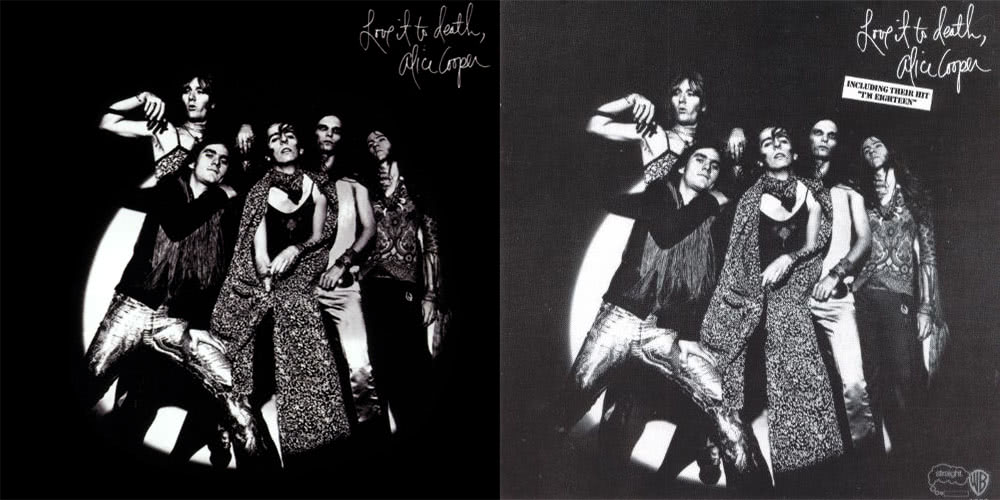
Kylie Minogue ‘Impossible Princess’ (1997)
While we’ve touched before on how the censors over in Saudi Arabia aren’t too fond on having female bodies on display, we never thought such censorship would extend to Australia’s Kylie Minogue.
Releasing her sixth album – Impossible Princess – in 1997, the record’s sleeve featured a photograph by Stéphane Sednaoui of Minogue dressed in a blue Véronique Leroy mini dress. Incidentally, the album’s title originally caused a bit of a stir over in Europe, having been released shortly after the death of Princess Diana.
While censors in Saudi Arabia were shipped European editions of the album (which removed the word ‘princess’, thus turning the record into a self-titled release), they also took issue with Kylie Minogue’s ‘revealing’ clothing.
As a result, copies of the Saudi Arabian version of this record feature a Photoshopped version of Kylie Minogue, now dressed in something that was deemed to be more ‘modest’.
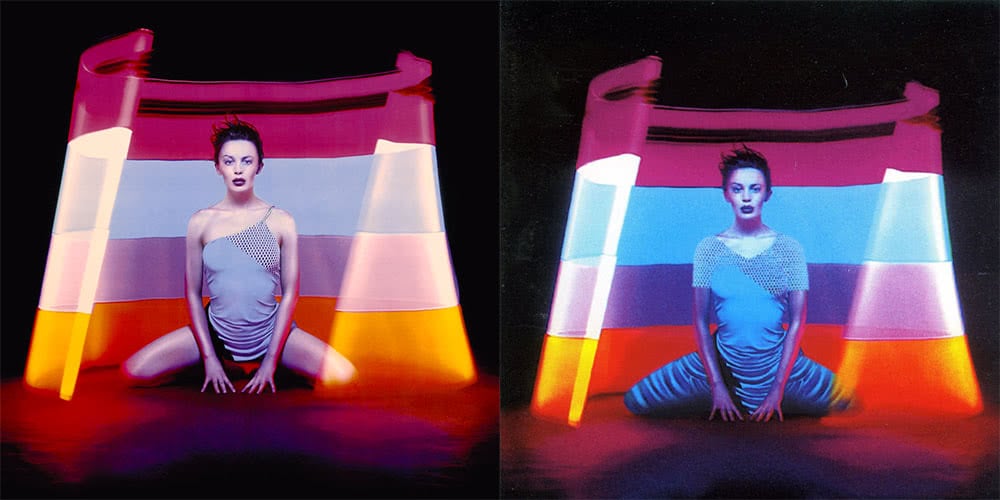
Massive Attack ‘Blue Lines’ (1991)
In the early ’90s, Bristol’s Massive Attack were cementing themselves as one of the pioneers of the trip-hop scene. Unfortunately for them, their rise to fame occurred during the same time as the infamous Gulf War.
Recognising just how easily their name could be associated with events of the war, the group actually shortened their name, going by Massive for a short period of time.
As a result, singles such as ‘Unfinished Sympathy’ and their debut, Blue Lines, were released under a slightly different moniker, becoming collector’s items in the process.
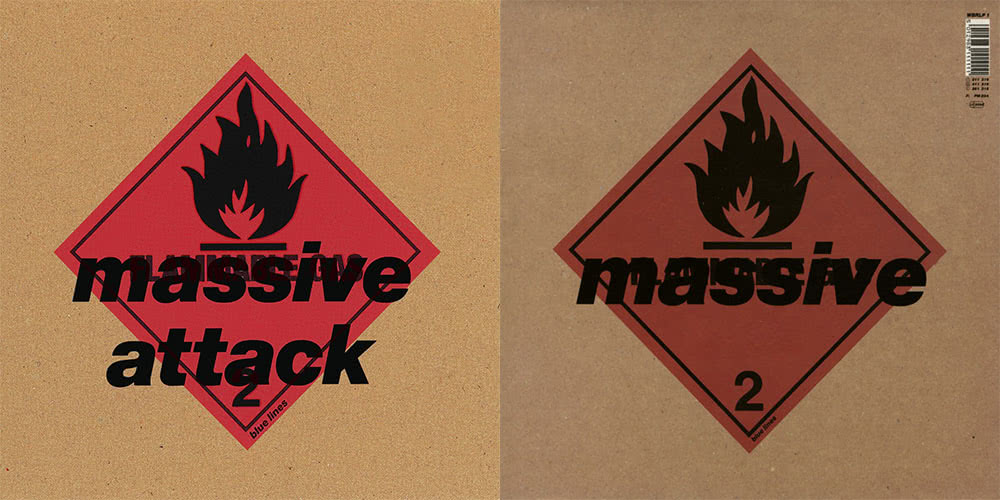
Red Hot Chili Peppers ‘Mother’s Milk’ (1989)
This might come as no surprise, but censors can be a rather conservative bunch. So when the Red Hot Chili Peppers released their 1989 album Mother’s Milk, you could image the controversy that its iconic album cover caused.
Featuring the band members cradled in the arms of a naked woman, the artwork also featured Anthony Keidis and a strategically-placed rose covering the main figure’s breasts. However, this wasn’t enough for some censors, who demanded the artwork be covered up even further.
As a result, another album sleeve was drafted for the American audience, featuring larger versions of the band members covering the majority of the female model’s body. While it’s something of a collector’s item now, it was undoubtedly an unnecessary moral panic back at the time.

Rammstein ‘Herzeleid’ (1995)
Rammstein’s debut record was subject to one of the strangest controversies we’ve ever heard of. Rather than being offended by lyrical content, nudity, or the aggressive music that they deliver, some people found themselves uncomfortable with the band’s appearance on the front cover.
Upon releasing Herzeleid (that’s ‘Heartache’ for you non-German speakers) in 1995, the band attracted controversy from the press for their shirtless, sweaty appearance. While the band had already seen some members of the public accuse them of alt-right leanings, these same people seemingly thought the band were attempting to look like skinheads, and were promoting racism with their album cover.
While the band vehemently denied the idea that the cover was a political statement, they provided their North American audiences with a different cover featuring a plain background, and the band member’s shown from the neck up.
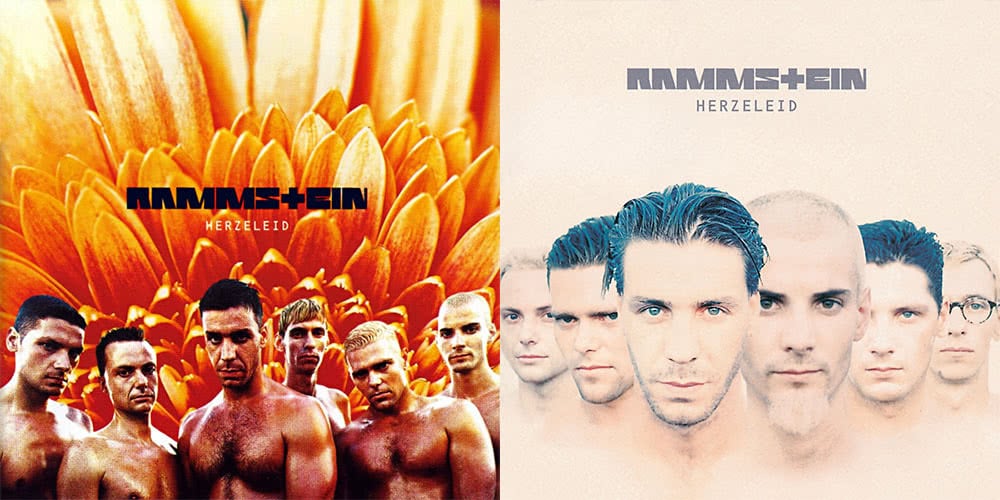
Jane’s Addiction ‘Ritual de lo Habitual’ (1990)
Unlike some of these entries on the list, Jane’s Addiction were under no illusion that their 1990 album – Ritual de lo Habitual – would be controversial, so they created a second cover, just to stick it to the censors.
Considering the fact that the band called their first album Nothing’s Shocking, and plastered two nude women on the cover, retailers might have known what they were getting into with this band. Nevertheless, the group provided this second cover so that stores that took issue with such artwork would be placated.
While the ‘clean’ cover featured text from the First Amendment of the U.S. Constitution (that is, the one that ensures ‘free speech’), the back cover contained text that warned the public that by not protecting the First Amendment, they were just playing into “Hitler’s syphilis-ridden dreams”. You can’t say they weren’t passionate.

Jimmy Eat World ‘Bleed American’ (2001)
As we’re sadly aware, countless people were affected by the horrific events of September 11th, 2001. However, a number of bands also had aspects of their musical releases affected by the nature of the political climate that followed.
One such example was Arizona’s Jimmy Eat World, whose fourth album had to be retitled following the attacks.
Originally released as Bleed American back in July of 2001, the band felt that the title could be misinterpreted following 9/11. As a result, the album was given an eponymous title, and it’s former title track was renamed to ‘Salt Sweat Sugar’, after the first line of the chorus.
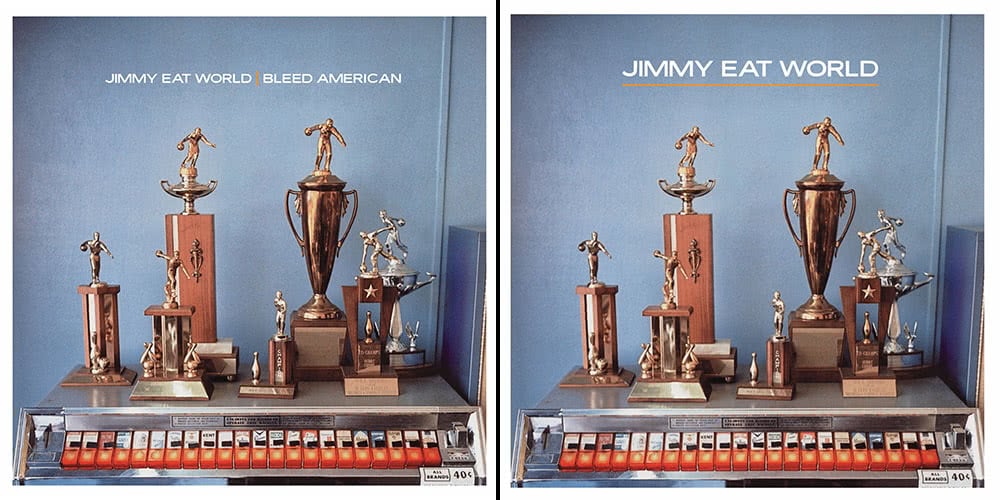
Dream Theater ‘Live Scenes From New York’ (2001)
Dream Theater also found their work recalled due to the events of 9/11, although their album fell victim so a coincidence so unfortunate that no one could have seen it coming.
Having recorded a concert in New York City back in 2000, Dream Theater decided to release the recording as part of a live package titled Live Scenes From New York.
To further the notion of the band’s fiery live show and the location that it was recorded, the original artwork featured an image of the Statue of Liberty and the World Trade Center in flames. You can probably see where this is going.
While this would usually have been a rather inconsequential pairing of music and artwork, it just so happened that the record was actually released on the morning of 9/11, making the artwork seem rather insensitive in light of the day’s events, highlighting it as controversial.
As a result, the album was recalled, and reissued with the band’s iconic Majesty symbol adorning the front cover.

The Coup ‘Party Music’ (2001)
To finish up this run of albums affected by 9/11, we’ll have to take a look to The Coup, an alternative hip-hop group fronted by Boots Riley. Releasing their fourth album, Party Music, in November of 2001, the record was released with a rather simple looking cover of a person holding a flaming cocktail.
However, this album was delayed a couple of months due to the intended artwork of the record, which featured Riley and Pam The Funkstress blowing up the World Trade Center. In hindsight, it’s a bit on the nose.
While Boots Riley wanted to keep the album cover (which had been designed months in advance) for political reasons, the record executives won, and we received a cover that was far less controversial than The Coup would have preferred.
